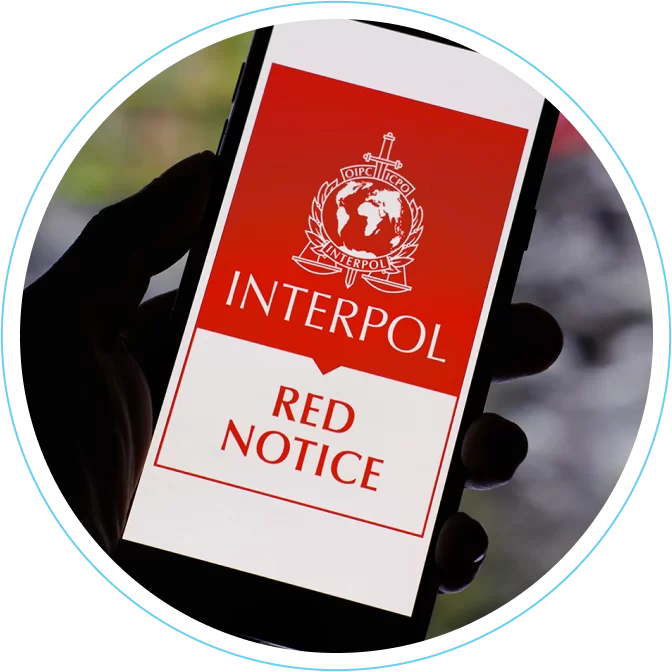
Interpol Search
Interpol can only search for you if a Red Notice has been issued against you. But how do you find out if Interpol is looking for you? Most people typically have no idea that they’re being sought by Interpol and only find out when they’re crossing a border or after they’ve been detained by law enforcement officers.

You can check the Interpol website in the “wanted persons” section or at the point to view red notices. The page displays a list of individuals wanted for criminal activity worldwide, the charges they’re facing, and critical crime-related information. If you find yourself listed as a suspect, it’s important to contact the relevant law enforcement authorities to find out why you are being sought by an international organization.
However, if you haven’t found yourself, you need to consider that the website doesn’t display a complete list of all wanted persons. Therefore, if you have reason to believe that you might be on the list, you can contact Interpol to gain access to the information or consult our qualified attorney for legal advice.
What international wanted lists does Interpol publish?
International search is divided into two groups:
Notifications
Interpol Notices are alerts allowing police in member countries to request collaboration to access information or arrest criminals and wanted individuals. These notices depend on their purpose and objective. They include:
- Red Notice: to locate and provisionally arrest a person pending extradition following the request of a member country through their Interpol national central bureau. These notices are mainly confined to law enforcement use and the information might not be publicly available;
- Blue Notice: for detecting, identifying, and obtaining any information about a person of interest in criminal investigations.
- Green Notice: warns about a person’s criminal activities, especially if that person is considered a threat to public safety;
- Yellow Notice: to locate missing persons or identify people unable to confirm their identity like minors and challenged individuals;
- Black Notice: searching for information on unidentified bodies;
- Purple Notice: for providing information about any information related to criminal activity;
- Orange Notice: used to signal an impending event or individuals posing a threat to others.
International requests for cooperation are published in the forms listed above and then are shared with the member states of Interpol. The Interpol General Secretariat regularly updates these lists with the information provided by the requesting country.
Warnings
They’re also called Interpol circulars or notices, which call for international cooperation, specifically for detention, arrest, and extradition. These types of alerts are more dangerous. Although they are registered in Interpol’s database they are available only for one or a few countries.
The Intricacies of International Searches Through Interpol Channels

Issuing an international arrest warrant for a person is one of the most common tools of abuse in criminal cases, especially against so-called “white-collar” individuals. Often, a person doesn’t even know that Interpol is looking for them and only finds out when crossing the border, by which time they are already detained.
Here, you’ll find answers to frequently asked questions about Interpol’s operations and international searches. You’ll discover information on preventing unlawful search notices, verifying data in Interpol’s databases, and how to remove information from its system.
Interpol is an international police organization that aims to facilitate cross-border cooperation between police officers in every member country to combat international crime. This independent body aims to make the world a safer place by assisting law enforcement agencies around the globe in communicating and coordinating with each other to prevent and investigate crimes that cross international boundaries.
Interpol is an international criminal police organization whose goal is to unite the efforts of law enforcement authorities from different member countries in the fight against crime. Interpol’s main activities include coordinating international searches and processing data in its information system.
Interpol categorizes international searches by color-coded notices: red, blue, green, yellow, black, purple, orange, special notices, and notices for stolen cultural property. These requests for cooperation are published and accessible in all Interpol member countries.
Diffusion сircular notices, or circulars, are also requests for international cooperation, specifically regarding detention, arrest, and extradition. A unique feature of these circulars is that while they are registered in the Interpol database, they are only accessible to one or a few countries. This is why circular notices are considered more dangerous.
If a person was detained in connection with being declared internationally wanted through Interpol channels, a red notice or circular alert would be issued against them.
An Interpol Red Notice is published under the following conditions:
- The person has committed serious crimes under common law and the case is criminal in most countries.
- The purpose of the search is to hold individuals accountable for crimes that carry a minimum sentence of 2 years of imprisonment, or serving a sentence of at least 6 months.
- The request aligns with Interpol’s objectives, is important for international cooperation, and is not used for unlawful persecution (political, military, religious, or racial).
- The announcement of a person’s search is made under the law.
There is an active arrest warrant or court order for detention. However, the member countries apply local laws to decide whether to detain a person.
What measures can be taken in response to the illegal issuance of an international arrest warrant for an individual?
If there are sufficient grounds to believe that law enforcement organizations are interested in illegally persecuting an individual, one can reach out to Interpol with what’s known as a “preventive request “. One of the key objectives of this request is to alert Interpol about the high likelihood of unlawful persecution.”
As a result, the individual will receive all the information regarding the receipt and content of the request to publish a notice of search. Such a request will be blocked, and Interpol is entitled to request additional information to verify the legality and compliance of the request with Interpol’s requirements. If the publication request does not meet Interpol’s rules, the list of wanted individuals will not be published.
How can you check if someone is in the Interpol databases?
If there’s reason to believe that someone has been declared wanted through Interpol channels, this information can be checked on the Interpol website. However, the website does not contain a complete list of wanted individuals, so it makes sense to contact Interpol directly to request access to their information.
What should you do if you’re wanted when crossing the border?
Most people find out they’re wanted when they cross the border. If someone on the lookout is identified through Interpol channels, local authorities are notified, and here’s what happens next:
- Detainment of a person by the authorities
- A personal search to ensure that the individual is not armed
- The protocols mentioned regarding the detention, according to the Red Notice
- Transfer to law enforcement agencies
- Delivery to court for resolution in case of arrest
- Actual extradition if necessary
Interpol’s search conclusion
If you find yourself on Interpol’s wanted list, immediately seek out an attorney specializing in immigration and international law, especially if you’ve been placed on Interpol’s red notice list. Since Interpol’s rules are complex and the organization doesn’t provide legal assistance to challenge a red notice, having legal support is extremely important. Even after being removed from Interpol’s list, your information might still be in local police databases, which could lead to arrest when crossing borders.
Make sure you have a copy of the letter from the CCF regarding your removal from Interpol’s database. This document can be used to prove that you’ve been removed from Interpol’s system. It’s also recommended to consult with lawyers who specialize in getting red notices removed in your destination country, so they can help get your name out of national police databases. If needed, our lawyers can assist you in getting records removed from Interpol’s database and provide the necessary clarifications.
Our lawyers are ready to represent the defendant’s interests and investigate the circumstances under which they’re wanted, by filing a request with the General Secretariat of the International Criminal Police Organization, or Interpol. We’ll support you at every stage of the case until the very end and help you win, including submitting requests to the executive committee. We guarantee that the national central bureaus will have minimal chances of winning, and we’ll do everything in our power to have your wanted notice rescinded.






